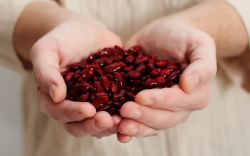When to Worry About Excessive Gas

Suffering from excessive gas can be a distressing and uncomfortable experience. It is most often the result of swallowing air when eating or drinking, but, in some cases, it can be a symptom of a more serious digestive disorder. To better understand this issue, learn what excessive gas is, how to treat it, and when to worry.
Causes
The occasional bout of gas is a perfectly normal biological response. Humans naturally take in air with the food they eat, and gas can also form internally. The bacteria present in the large intestine ferment certain types of carbohydrates like starches and sugars, and gas can be a byproduct of the fermentation process. Some of the gas is absorbed by the bacteria, while some of it is expelled through flatulence or belching.
Digestive Disorders Associated With Excessive Gas
 Most mild to moderate bouts of excessive gas are the result of eating certain foods, usually those with high fiber (and high starch) content like beans and whole grains. Burping and passing gas, two normal and healthy bodily processes, are common with this type of gas.
Most mild to moderate bouts of excessive gas are the result of eating certain foods, usually those with high fiber (and high starch) content like beans and whole grains. Burping and passing gas, two normal and healthy bodily processes, are common with this type of gas.
However, more serious episodes of excessive gas, which can involve extreme belching, flatulence, and stomach pain, may be a sign of a digestive disorder. Irritable bowel syndrome is a common digestive disorder whose cause is not fully understood, but it frequently causes excessive gas and abdominal pain. Celiac disease is an adverse immune response stemming from the intestines' inability to digest gluten. Excessive gas can also be an early warning sign of colon cancer.
See a doctor right away if your excessive gas is long-lasting or accompanied by bloody stools, bowel changes, weight loss, or abdominal or chest pain.
Treatment
To eliminate excessive gas, dietary changes are often beneficial. Reduce your intake of high-fiber foods, dairy products, and sugars, including artificial sweeteners. Deep-fried foods can also be aggravating to the gut, so consider limiting your consumption. Eat slowly, chew mindfully, and drink water with your meals. Over-the-counter treatments, such as digestive enzymes, activated charcoal, or lactose supplements, are helpful for some people.
If excessive gas is interfering with your ability to comfortably live or work, always see a doctor. The gastroenterologists at Naugatuck Valley Gastroenterology Consultants and Endoscopy Center are here to help. Since 1989, they have been treating patients throughout Prospect, CT, and all of New Haven County. They perform colonoscopies, endoscopies, and a range of other diagnostic procedures to determine the cause of your digestive disorder and the most appropriate course of treatment. Call (203) 756-6422 to schedule an exam or visit them online to learn more.
About the Business
Have a question? Ask the experts!
Send your question

